Snowball Surname Ancestry ResultsOur indexes 1000-1999 include entries for the spelling 'snowball'. In the period you have requested, we have the following 131 records (displaying 1 to 10): Single Surname Subscription | | | Buying all 131 results of this search individually would cost £706.00. But you can have free access to all 131 records for a year, to view, to save and print, for £100. Save £606.00. More... |
These sample scans are from the original record. You will get scans of the full pages or articles where the surname you searched for has been found. Your web browser may prevent the sample windows from opening; in this case please change your browser settings to allow pop-up windows from this site. Inhabitants of Cheshire and North Wales
(1400-1409)
The county of Cheshire had palatine status, being in some measure independent of the rest of England: moreover, from the Statute of Wales of 1284, after king Edward I's subjugation of North Wales, until the union of England and Wales in 1536 to 1543, much of the administration of North Wales (county Flint in particular) was directed from Chester. When the Chester Recognizance Rolls were moved from Chester to the Public Record Office, they were placed among the Welsh Records. These rolls, so called because they do include recognizances (of debts &c.) among their contents, are in fact the Chancery Rolls of the palatinate, containing enrolments of charters, letters patent, commissions and other documents issued under the seal of the palatinate. Deeds and other evidences of a private nature were also enrolled on them. A calendar of the Recognizance Rolls from their commencement to the end of the reign of Henry IV was prepared by Peter Turner and included in the 36th Annual Report of the Deputy Keeper of the Public Records in 1875. We have now indexed this, dividing the enrolments into decades. This is the period from the 1st to the 11th years of king Henry IV.SNOWBALL. Cost: £6.00.  | Sample scan, click to enlarge

| The English in France
(1456)
King Henry VI of England (one of the grandsons of Charles VI of France) claimed the throne of France (and quartered the fleurs-de-lis of France with the lions of England on the royal standard) as had his predecessors since Edward III, as descendants of Philip IV of France. The English had real power or influence in Brittany, Normandy, Flanders and Gascony, and actual possession of several coastal garrisons, in particular Calais, where the French inhabitants had been replaced by English. Henry VI came to the throne only seven years after his father had trounced the French at Agincourt; but his cousin, Charles VII, who became king of France in the same year, spent his long reign rebutting the English king's claim to his throne by territorial reconquest and consolidation. The English administration kept a series of records called the French Rolls. On these are recorded royal appointments and commissions in France; letters of protection and safe-conduct to soldiers, merchants, diplomats and pilgrims travelling to France from England and returning, and to foreign legations. There are also licences to merchants to export to the Continent, and to captains to transport pilgrims. As Henry VI's reign progressed, and the English grip on northern France loosened, the French Rolls also increasingly include entries concerning the ransoming of English prisoners.SNOWBALL. Cost: £6.00.  | Sample scan, click to enlarge
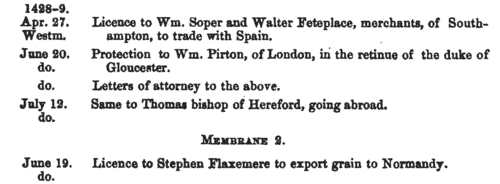
| Tenants of the Bishop of Durham
(1580)
'A Booke of Surveighe and an Abstract out of the Rentale of all the Landes, Tenementes and Revenews that belonge to the Cathedrall' Churche of Durism' with the perfect and perticuler State therof, mayd anno Reginae Elizabethae vicissimo secundo, 1580' was edited by John Booth and printed by the Surtees Society in 1886. The bishopric had an extensive rental in the city and county of Durham; eight places in Northumberland are mentioned; and then there are glebe rentals from rectories in county Durham and Northumberland in the bishop's hands. Greater detail is then given of the tenants of the manors in county Durham held as of the cathedral priory - Aycliffe, Bellasis, (Newton) Bewley, Billingham, Burdun, Chilton, Coupon, Dalton, Edmondbyers, Ferry (Hill, or Ferrycliffe), Fulwell, Harton, Hebburn, Hedworth, Hesledon, Heworth, Jarrow, Kirk Merrington, East Merrington, West Merrington and Mid Merrington, Monkton, Moorsley, Newton Ketton, Nunstanton, North and South Pittington, East and West Rainton, Ravensflat, Shields, Southwick, Spen, Usworth, Wallsend, Wardley, Wearmouth, Westoe, Willington and Wolviston. Finally, there is a list of new leases granted out at lotteries by the late dean of Durham and the prebendaries there; fines received but not yet paid into the cathedral funds; and the names of tenants (of the priory) claiming tenant right and refusing to take leases.SNOWBALL. Cost: £4.00.  | Sample scan, click to enlarge
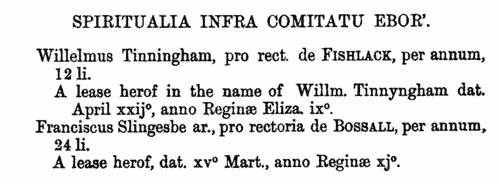
| Quarter Sessions for the North Riding of Yorkshire
(1605-1612)
The Quarter Sessions minute books for the North Riding from April 1605 to July 1612 were edited by the Rev. J. C. Atkinson for the North Riding Record Society and published in 1884. This is a calendar of sessional orders, minutes of criminal cases, memoranda and other entries of record concerning the administration of the riding, for the quarter sessions and special sessions held at Thirsk, Stokesley, Richmond, Malton, Helmsley, Northallerton and Topcliffe. Recusants (persons refusing or neglecting to attend parish church services) are listed in the summary of prosecutions on pages 4-5, 10, 17, 21, 42, 55-56, 61, 65, 69, 72, 79, 82, 95, 99, 113-115, 122, 131, 153-155 and 176. SNOWBALL. Cost: £4.00.  | Sample scan, click to enlarge
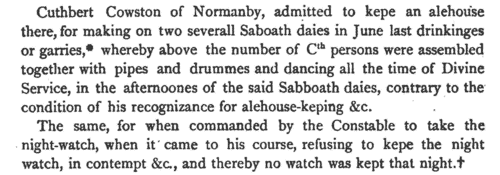
| Treasury Books
(1697-1698)
Records of the Treasury administration in Britain, America and the colonies, from 1 October 1697 to 31 August 1698. These also include records of the appointment and replacement of customs officers such as tide waiters and surveyors.SNOWBALL. Cost: £4.00.  | Sample scan, click to enlarge
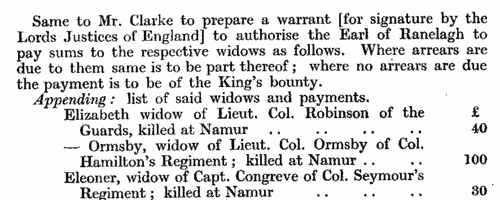
| House of Lords Proceedings
(1699-1702)
Private bills dealing with divorce, disputed and entailed estates: petitions, reports and commissions: naturalisation proceedings.
SNOWBALL. Cost: £4.00.  | Sample scan, click to enlarge
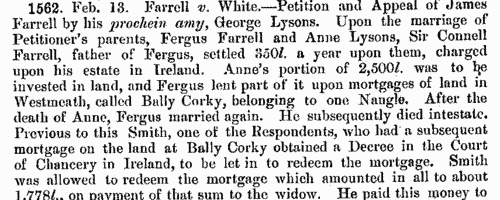
|  Apprentices registered at Durham
(1717-1719) Apprentices registered at Durham
(1717-1719)
Apprenticeship indentures and clerks' articles were subject to a 6d or 12d per pound stamp duty: the registers of the payments usually give the master's trade, address, and occupation, and the apprentice's father's name and address, as well as details of the date and length of the apprenticeship. There are central registers for collections of the stamp duty in London, as well as returns from collectors in the provinces. These collectors generally received duty just from their own county, but sometimes from further afield. Because of the delay before some collectors made their returns, this register includes indentures and articles from as early as 1716. (The sample entry shown on this scan is taken from a Norfolk return)SNOWBALL. Cost: £8.00.  | Sample scan, click to enlarge

|  Masters and Apprentices
(1744) Masters and Apprentices
(1744)
Apprenticeship indentures and clerks' articles were subject to a 6d or 12d per pound stamp duty: the registers of the payments usually give the master's trade, address, and occupation, and the apprentice's father's name and address, as well as details of the date and length of the apprenticeship.SNOWBALL. Cost: £8.00.  | Sample scan, click to enlarge

|  Masters of apprentices registered in York
(1762) Masters of apprentices registered in York
(1762)
Apprenticeship indentures and clerks' articles were subject to a 6d or 12d per pound stamp duty: the registers of the payments usually give the master's trade, address, and occupation, and the apprentice's name, as well as details of the date and length of the apprenticeship. There are central registers for collections of the stamp duty in London, as well as returns from collectors in the provinces. These collectors generally received duty just from their own county, but sometimes from further afield. The indentures themselves can date from a year or two earlier than this return. (The sample entry shown on this scan is taken from a Bristol return. Each entry has two scans, the other being the facing page with the details of the indenture, length of service, and payment of duty.) IR 1/54SNOWBALL. Cost: £8.00.  | Sample scan, click to enlarge

| City of Westminster Voters
(1780)
The poll for the election of two citizens to serve in Parliament for the City and Liberty of Westminster was begun 7 September and ended 23 September 1780, the candidates being the Hon. Charles James Fox (F), Sir George Brydges Rodney, bart. (R), and the Right Hon. Thomas Pelham Clinton the Earl of Lincoln (L). In this poll book the names of all voters are given, by parish and within each parish by street, arranged alphabetically by surname and christian name, with the individual votes cast shown in the right hand columns. Pages 1 to 48 cover the parish of St George, Hanover Square; 49 to 100, St Martin; 101 to 134, St Clement and St Mary le Strand; 135 to 155, St Ann, Soho; 157 to 166, St Paul, Covent Garden; 167 to 170, St Martin le Grand; 171 to 224, St James; 225 to 274, St Margaret and St John.SNOWBALL. Cost: £6.00.  | Sample scan, click to enlarge
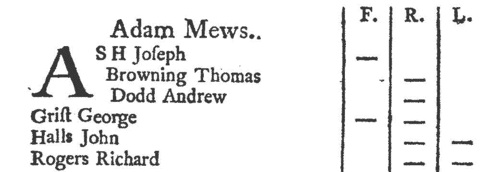
|
Research your ancestry, family history, genealogy and one-name study by direct access to original records and archives indexed by surname.
|













